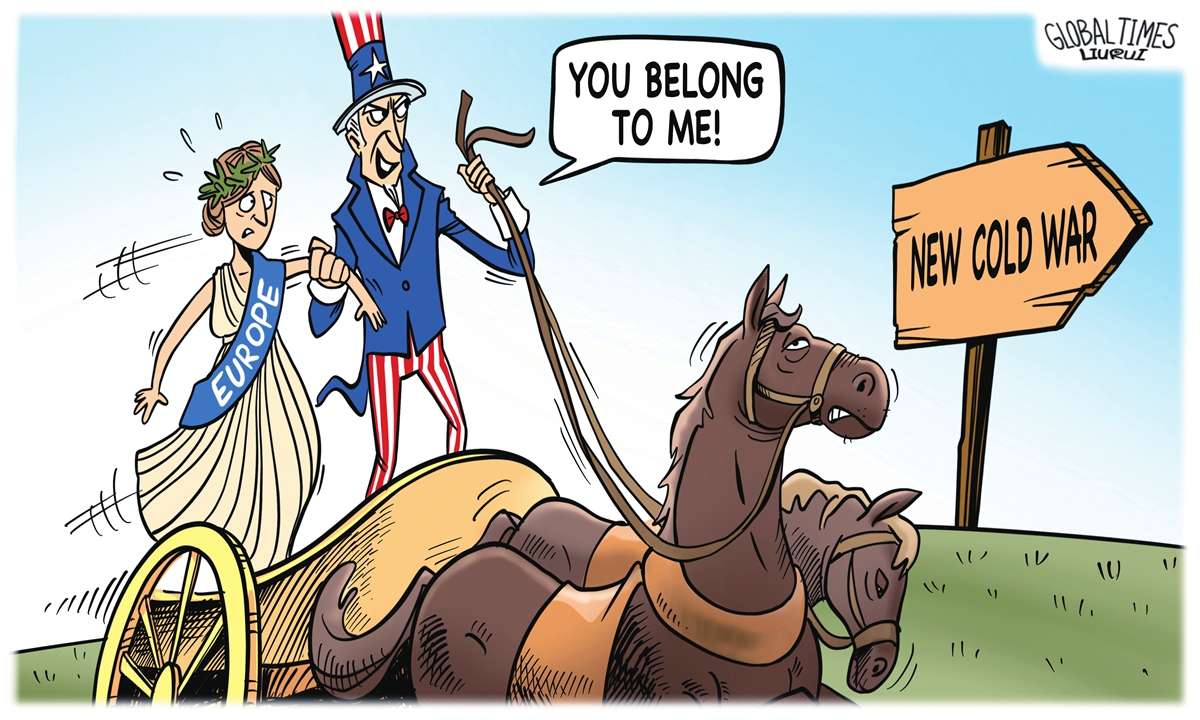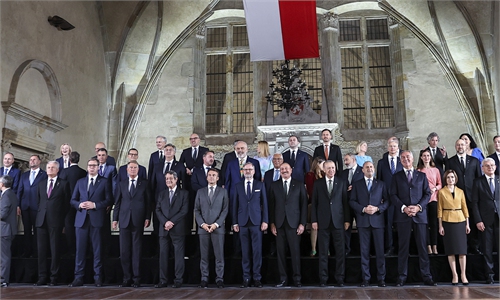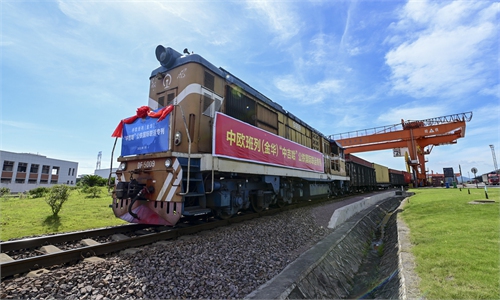
Illustration:Liu Rui/GT
According to Bloomberg, German Chancellor Olaf Scholz will visit China in early November. If it proves to be true, his Tuesday remarks that "decoupling with China would be the wrong path" and that "globalization has been a success story that enabled prosperity" explicitly delivered what is the mainstream attitude of Germany.Ending globalization and decoupling from China to form a relatively closed political-economic bloc dominated by the US is the new geopolitical pattern Washington has been trying to promote. The US has strengthened its technological blockade against China, and has always wanted to pull the whole of Europe into its tech-economic chariot against China. As some European countries and enterprises also feel some pressure from China's modernization, voices echoing the call to pursue "decoupling from China" of the US are gradually increasing.
Since the Russia-Ukraine conflict, the entire West has decoupled from Russia in a shock-like manner. The US then took the lead in threatening China: if China provides military assistance to Russia, or helps Russia systematically evade sanctions, it would "absolutely" face consequences. The US has further threatened that once the Chinese mainland resolves the Taiwan question by force, the West will sanction China in the same way as it did with Russia, which means "complete decoupling."
That is to say, the US has created a future scenario and possibility of a complete decoupling of the West from China, which actually constitutes a strategic coercion to Europe. Josep Borrell, the EU's High Representative for Foreign Affairs and Security Policy, said in a speech on Monday that Europe's prosperity is built on cheap energy from Russia and access to the big China market, in addition to security protection from the US. In his view, "this is a world that is no longer there." This reflects the complex mentality of some Europeans.
What Borrell said about the importance of Russia and China to European prosperity is an indisputable fact. Europe is not the US. It does not have the US' ability to innovate and monopolize semiconductor and internet technologies. It is not self-sufficient in energy, and is weak militarily. Europe as a whole lives in the shadow of American hegemony. Maintaining long-term prosperity means greater challenges for Europe. Among them, the biggest strategic issue in Europe after the Cold War has always been how to gain more political and economic autonomy and create more independent space for its own prosperity.
Both China and Russia are partners, not rivals, of the EU in establishing its strategic autonomy. The Nord Stream gas pipeline, which has been strongly opposed by the US, has now been sabotaged, heralding the end of Europe's use of cheap Russian energy. To further promote the decoupling of Europe and China is Washington's attempt to kill two birds with one stone, or even three birds with one stone, through the Russia-Ukraine conflict - it will simultaneously hit the economies of Russia and China, whilst also making Europe further entrapped in a vassal status to the US and unable to extricate itself. Separating the three major powers of China, Europe and Russia from each other will be more conducive to the US to defeat each of them and consolidate its hegemony again.
But some European elites are now waking up. French Finance Minister Bruno Le Maire on Monday publicly criticized the US of pushing energy shortages and hiking up the prices of LNG through the Russia-Ukraine conflict, saying that "We cannot accept that our American partner sells its LNG at four times the price at which it sells it to its own companies." He said that "the conflict in Ukraine must not end in American economic domination and a weakening of the EU."
The statements of Scholz and the French finance minister actually conveyed the same dissatisfaction and sense of crisis, indicating that after the Russia-Ukraine conflict that has lasted for more than half a year, Europeans have gradually found that the strategic direction of the situation is becoming seriously unfavorable to Europe, and the US has become the biggest beneficiary of the war, and Washington is trying to expand the unilateral benefits of its own.
There is no geopolitical conflict between China and Europe. The US has repeatedly promoted and shaped China as a geopolitical opponent of the entire West, all for Washington's own selfishness. Because the US has strong control over European elites, some of the latter disregard European interests and brag about American strategic tricks as serving European interests.
The Chinese have firm strategic wills, and we hope that the Europeans can also maintain a basic sobriety and not be hijacked by the US. In the first eight months of this year, European companies' investment in China surged by 123.7 percent. Many European manufacturing giants continue to bet part of their future on cooperation with China, and they are expressing their attitude toward Europe's China policy with their actions.
On the contrary, it was reported that the UK's Liz Truss government is preparing to redefine China from a "systemic competitor" to a "threat" to the UK. The UK is the No.1 vassal of the US in Europe, and Downing Street wants to bring Europe together to help the US confront China. Let Truss do it herself. Britain is in crisis - Scotland is fighting for a new independence referendum. A country that does not seek to develop itself and try to profit from its relationship with the US has no future. The UK is becoming more and more marginalized, and I believe that Europe will not go the same direction.
The author is a commentator with the Global Times. opinion@globaltimes.com.cn




